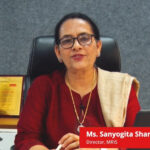With the moving wheel of time and the manifestation of a global perspective by the Indian populace, the relevance of traditional modes of learning is going archaic; giving way to the eagerness for quality education that matches global stature and surpasses run-of-the-mill norms. Today, more than ever, new-age Parents want their children to acquire an education that is a cut above the customary educational benchmarks; the kinds that fosters in them an inquisitiveness to critically examine everything they come across in their quest of exploration; the kinds that propels them to discover their unique potential that not only empowers them to rise above the beaten path but also accommodates them on the pedestal of global virtuosity and eminence.
The IB Curriculum is one such sought-after path of Education that prepares students to attain a Global Perspective of competence and leadership. Dr. Gauri Bhasin – Executive Director, Learning and Development, MREI, and a pioneer in devising pathbreaking mechanisms to bring about excellence in education in the Indian Subcontinent, opines and expounds on the factors that shape IB Education at MRIS as it marches towards its motto of ‘Sustainability Drives Globality’
The Author’s Perspective
Sustainability Drives Globality: What Shapes the IB Education at MRIS?

“If it can’t be reduced, reused, repaired, rebuilt, refurbished, refinished, resold, recycled, or composted, then, it should be restricted, designed or removed from the production,” This quote by Pete Seeger, aptly paints the canvas of International Baccalaureate (IB) Educational Programme at Manav Rachna International School, Sector 14, Faridabad – an IB Candidate* School offering PYP*, MYP* and DP*.
Manav Rachna Educational Institutions have always walked the extra mile to deliver educational excellence for the past 26 years and as we row further into the future, with our roots set in the global realm, the very next step is to open the doors of International education for the learners who want ‘More’- More quality education, more global competence and more intellectual acumen.
As Manav Rachna firmly cements its feet in the sphere of the International Baccalaureate Program, it is guided by the rich vision of the founder visionary Dr. O.P. Bhalla allowing students, teachers, and staff members to delve into luminous learning, branching out in the different fields of innovation, expertise & skills, and thriving on the quest to seek ‘The Best.’ The philosophy of Manav Rachna International School’s IB Educational Program emphasizes, ‘Achievement is not a destination but a non-ending journey of awareness to chase discerning capabilities.’
Let us first understand, what Globality and Sustainability actually stand for.
Globality is the consciousness of the world as a single place and the concept signifies the deepening the consciousness of the world as a whole. This could thus be considered the phenomenological aspect of globalization. Robertson defined Globality as “the compression of the world and the intensification of consciousness of the world as one place.”
Sustainability is a societal goal that relates to the ability of people to safely co-exist on our planet ‘Earth’ over a long time. Sustainability is commonly described as having three dimensions or pillars: environmental, economic, and social. If the pillar of the Environment is safe and sustained, then the other two pillars, i.e. Economy and Society will sustain well, as every integrant of sustainability depends on a conducive environment which can foster and drive growth.
As the world becomes more interconnected, it is essential to develop a perspective that takes into account the impact of our actions on the environment and society. Inculcating all three pillars of sustainability into our learning processes can help us adapt a course that focuses on creating a global mindset through sustainability. At Manav Rachna, we do the same through our IB Curriculum.
Embedding the principles of sustainability in the curriculum is a need that arose from our goal to help students develop a deeper understanding of the interdependence between people, the planet, and prosperity. Our approach to education emphasizes innovative critical thinking, problem-solving, skill-based learning, and exploring one’s talents. This is reflected in the way we groom our students. We make them self-reliant, ingraining skills that help them attain opportunities to compete on Global Platforms. We encourage our learners to think beyond conventional solutions; and explore the potential of new technologies and systems that promote sustainable practices. By doing so, we aim to develop leaders who can drive sustainable development and create a positive impact in the world. By embedding sustainability principles, cultural diversity, and community engagement in the IB learning format, we are entrusting and accrediting young minds to open up in a Global arena where sustainability takes the center stage.
Shaping IB Education at MRIS
 Following the guidelines of IB, MRIS Sector 14, an IB Candidate* School focuses on the changing dynamics of education for learners from a very young age. The aim of IB Education is to develop global citizens who recognize their responsibility towards humanity and the planet as a whole. At Manav Rachna International School, we strive to create open-minded, knowledgeable, caring and balanced communicators who turn out to be future nation-builders.
Following the guidelines of IB, MRIS Sector 14, an IB Candidate* School focuses on the changing dynamics of education for learners from a very young age. The aim of IB Education is to develop global citizens who recognize their responsibility towards humanity and the planet as a whole. At Manav Rachna International School, we strive to create open-minded, knowledgeable, caring and balanced communicators who turn out to be future nation-builders.
Our mentors are putting in lots of effort to take this stratagem forward. The skills of our mentors are also enhanced by exposing them to national and international training and workshops that sharpen their acumen. What is considered extra-curricular in the traditional schooling system is embedded in the main academic curriculum and implemented via collaborative student-led initiatives.
MRIS adheres to all the critical elemental innards of a premier Educational Field- International Standards, Best Practices, and Research and Developments in Teaching and Learning. It collaborates with policymakers all over the globe to improvise the ongoing curriculum and take it a notch up every day.
The IB Learner profile at MRIS clearly outlines the attributes that need to be inculcated in its students. Contrary to customary norms wherein learners follow a predefined pedagogy, at MRIS IB, the Learner profile shapes the pedagogy and assessment methods used in the Curriculum.
To make the transition to IB easier for new learners, educators have curated a well-aligned prep series – BRIDGE PROGRAMME, that entails several sessions on different themes through experiments and workshops. The programme is intended to acclimatize learners to the learning process at IB.
In summation, I would like to emphasize that IB Education at Manav Rachna International School not only encourages amongst its students a global perspective fostering intercultural understanding but also makes them well-equipped to attain admissions to premier institutions of higher education across the globe with the aid of their critical thinking, creativity and problem-solving skills which they have had attained at MRIS.
To know more about the curriculum and explore admissions, visit mris.edu.in/global.
Authored: Dr. Gauri Bhasin
Executive Director – Learning and Development, Manav Rachna Educational Institutions.
*MRIS is an IB Candidate School for PYP, MYP and DP. Please visit mris.edu.in/global for full disclaimer.





